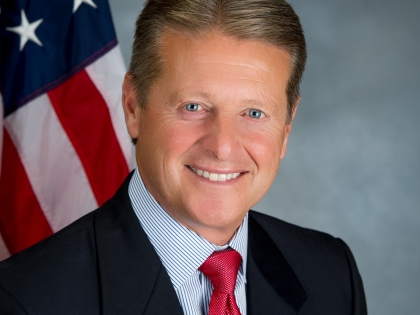
Gallivan Joins Families At Emotional Press Conference Prior to I-STOP Enactment
Patrick M. Gallivan
June 11, 2012
-
ISSUE:
- Codes
- Crime
- Health
- Controlled Substances
- Drugs
Final Proposal Includes “Real-Time” Prescription Drug Tracking To Eliminate “Doctor Shopping”, Creates Safe Disposal Program, Improves Education and Awareness for Prescribers
WEST SENECA, NY - Families from across Western New York joined with the Western New York Legislative Delegation Saturday at the local offices of Kids Escaping Drugs in West Seneca to discuss the landmark agreement reached this week on a comprehensive prescription drug reform package that will make New York State a national leader in curbing prescription drug abuse.
The agreement announced this week by the Governor Andrew Cuomo, Attorney General Eric Schneiderman, and legislative leaders from both the Senate and the Assembly modernizes the way prescription drugs are distributed and tracked in New York State, including enacting a “real time” prescription monitoring registry to provide timely and enhanced information to practitioners and pharmacists; requiring all prescriptions to be electronically transmitted; improving safeguards for the distribution of specific prescription drugs that are prone to abuse; empowering a workgroup of stakeholders with the responsibility to help guide the development of medical education courses and other public awareness measures regarding pain management and prescription drugs; and requiring the Department of Health to establish a safe disposal program for unused medications.
Several parents who lost children to prescription drug related deaths took this opportunity to offer their thanks to the Western New York Delegation for acting as a driving force in Albany to secure bipartisan support for this important legislation in both the Senate and the Assembly, and to detail their years-long advocacy mission to implement a “real-time” prescription drug tracking registry in New York State.
“I want to let everyone know we could not have accomplished what we did in such record time without the committed and sustained support from all of our state legislators from western New York. This new law that will be signed, hopefully soon, will help ensure that future generations of parents will have peace of mind that schools are safe and their children will not be exposed to the amount of illicit prescription narcotics that are available today. I thank them all and look forward to building upon our accomplishments on the state level,” said Avi Israel of Buffalo, father of Michael Israel, who took his own life last year under the pressures and agony of his addiction.
We believe the I-STOP legislation will help save lives. We have lost too many young lives because of these powerful highly addictive prescription drugs and this new approach will held educate doctors on how to help their patients with pain and prescribing pain medication. This will then help prevent addiction and control the quantity of unused drugs that sit in everyone’s medicine cabinets. The I-STOP bill will also work to dispose of unused prescription drugs before they get into the wrong hands,” said Suzanne Crotty of Colden, who lost her son Zack in 2009 to a accidental overdose because of different medications different doctors were providing while he was continuing to battle opioid addiction.
“The issue of prescription drug addiction and abuse has grown rapidly over the last few years, especially here in Western New York,” said Senator George D. Maziarz, R,C,I – Newfane. “This legislation takes a multi-faceted approach to addressing this important issue, and most importantly can help save the lives of thousands of people right here in our community. While we pause to remember those who have battled their addictions and lost, we now know that we are taking a pro-active approach to fixing this problem. I applaud the Legislature, Governor and Attorney General for working together to create this necessary bipartisan legislation.”
“Prescription drug abuse is one of the greatest public health challenges of our generation, and as evidenced by the families here today, addiction and its devastating consequences do not discriminate. The legislative agreement reached this week will create the most comprehensive, state-of-the-art anti-prescription drug abuse system in the United States – one that finally includes real-time prescription tracking to ensure dangerous opioids and controlled substances are monitored and disseminated securely,” said Senator Patrick M. Gallivan, R-Elma. “No law can ever be devised to replace what was taken from the families who paid the ultimate price to drug addiction, but I do hope that when this law is enacted, they find some peace-of-mind that it was only accomplished through their passion and through their perseverance.”
“Our community especially needs this oversight, having been identified for having some of the most abused opioids and in light of the recent string of suicides resulting from prescription drug abuse,” said Assemblymember Dennis Gabryszak, D-Cheektowaga. “This is a problem that will not fix itself, in fact, it will only grow more and more dangerous, and we cannot allow that to happen. A real-time’ database for physicians and pharmacists to check before dispensing certain drugs will help combat what has become an overwhelming epidemic of doctor shopping and black-market dealing of highly addictive pain killers.”
“The WNY families who channeled their grief into action have fueled this movement to combat prescription drug abuse. Without their courage, we would not be making this announcement today. Their successful lobbying efforts demonstrate the public’s power to initiate reform when we all stand up together and demand change.” said Senator Tim Kennedy, D-Buffalo. “When we began working on this issue last year, I introduced the Michael David Israel Laws – a comprehensive legislative package named for a young man who took his own life after battling addiction. Many of the concepts we covered in the Michael David Israel Laws are included in this final negotiated bill – things like online tracking, physician training and electronic prescriptions. Now that we have agreement, we must move this measure forward quickly. Delay just means more lives lost – one person dies every 19 minutes as a result of prescription drug abuse nationwide.”
“As we watch prescription drug abuse become one of the fastest growing drug problems, I am pleased that New York State is a thought leader in methods of systematic reforms that will modernize the way prescription drugs are distributed and tracked, ” stated Senator Mark Grisanti (R-Buffalo). “Working in a bi-partisan manner, Albany has reached consensus on the creation of a real time prescription monitoring registry which allows doctors and pharmacists access to instant vital information to stop abuse, illegal transfer of scripts and theft. I stand here today committed to work with my colleagues to pass this landmark comprehensive prescription drug reform package.”
"Avi and Julie Israel and all the other families who have advocated for I-STOP throughout Western New York and the entire state should be very proud of what they have accomplished," said Assemblyman Sean Ryan (D-Buffalo). "While nothing can be done to bring back those who tragically have been lost, the families should know that their hard work and advocacy has crafted legislation that will save lives, reform a broken system, and help to stem the tide of prescription drug abuse in New York State."
"This legislation will go a long way towards making New York State a leader in the tracking and monitoring of prescription drugs. I would like to thank the families and advocates who have worked tenaciously to see it come to fruition. The abuse of illicit prescription drugs has taken too many lives and this bi-partisan legislation will help protect patients and make it more difficult to divert these drugs illegally," said Assemblywoman Crystal D. Peoples-Stokes, (D-Buffalo).
“By utilizing real-time prescription monitoring, the ISTOP initiative will go a long way toward combating prescription-drug abuse, which is a growing epidemic across our state and has severely impacted Western New York’s communities,” said Assemblyman John D. Ceretto (R-I, Lewiston). “I look forward to working with my colleagues from both sides of the aisle to pass this bill and other initiatives to help make our communities safer from prescription-drug abuse.”
“The scourge of prescription drug abuse can tear apart families and put children down a path to addiction and even stronger substances,” said Assemblyman Ray Walter, R-Amherst. “Thanks to the advocacy of Avi and Julie Israel, we have taken a proactive step toward addressing this problem, putting together a registry program based on compromises ensuring the thoughts and concerns of doctors, pharmacists and patients are all addressed. I applaud Governor Cuomo, Senate Majority Leader Skelos, Assembly Speaker Silver and my colleagues here today for putting politics aside and taking action against the dangers o prescription drug abuse.”
Illicit use of prescription medicine has become one of the nation’s fastest-growing drug problem. According to the federal Centers for Disease Control and Prevention (CDC), nearly 15,000 people die every year of overdoses due to prescription painkillers. In 2010, 1 in 20 people in the United States over the age of 11 reported using prescription painkillers for nonmedical reasons in the past year. During the period 1999 through 2008, overdose death rates, sales, and substance abuse treatment admissions related to prescription painkillers all increased substantially. Sales of opioid painkillers quadrupled between 1999 and 2010. Enough opioid painkillers were prescribed in 2010 to medicate every American adult with 5mg of hydrocodone every four hours for a month. Moreover, an estimated 70 percent of people who abuse prescription painkillers obtained them from friends or relatives who originally received the medication from a prescription. The problem is of particular concern with respect to young adults and teens.
“The abuse of prescription medication is an epidemic, unfortunately we at Kids Escaping Drugs (KED) see the prevalence of that abuse among adolescents. Prescription medications have become a gateway drug among this population, and many do not think twice about popping a couple pills. Teens seem to be under the false impression that prescription medications are “safer” than street drugs. Unfortunately, many do not realize that they can be just as addicting as the street drugs. There is a natural progression from the pills into the street drugs due to the high cost of the prescription medications on the streets. KED believes I-STOP will greatly reduce the availability of prescription medications to those they are not prescribed for, and we are thrilled to see this bill making such progress in Albany, as it will save countless lives,” said Jessica Sherman, LMSW, director of the Face 2 Face Program for Kids Escaping Drugs WNY.
Details of the legislation are as follows:
The Creation of a New and Updated Prescription Monitoring Program (I-STOP)
The legislation will require updating and modernization of Department of Health (DOH)’s Prescription Monitoring program (PMP) Registry to make it one of the best systems in the nation to monitor prescription drug abuse. I-STOP will significantly limit opportunities for “doctor shoppers” to illegally procure prescriptions from multiple practitioners. It requires enhancement and modernization of DOH’s secure prescription monitoring program registry, which will include information about dispensed controlled substances reported by pharmacies on a “real time” basis, to effectively stop doctor shopping and limit the supply of illegal prescription drugs.
The PMP Registry will be secure and be easily accessible by practitioners and pharmacists, allowing them to view the controlled substance history of each individual patient. In addition, this legislation strikes a balance by requiring health care practitioners to consult the PMP Registry before prescribing or dispensing the controlled substances that are most prone to abuse and diversion, while exempting practitioners from consulting in specific situations in order to protect patient access to needed medications. Moreover, pharmacists, for the first time, will now be able to consult the PMP Registry before dispensing a controlled substance.
Mandating Electronic Prescribing of Controlled Substances
The comprehensive package will make New York a national leader by being one of the first states to move from paper prescriptions to a system mandating the electronic prescribing (e-prescribing) for all controlled substances with limited exceptions. E-prescribing is critical to help to eliminate diversion that results from the alteration, forgery, or theft of prescription paper.
In addition, electronic prescribing enhances patient care by minimizing medication errors due to misinterpretations of handwriting on written prescriptions. It is estimated that 20 percent of the approximately 7,000 annual deaths caused by medication errors are attributable to misinterpretations of written prescriptions.
E-prescribing of controlled substances will ensure that controlled substance transactions are transmitted in a secure, encrypted fashion to their intended recipient.
Updating the Controlled Substance Schedules to Stop Abuse of Certain Drugs, While Protecting Patient Access
The legislation combats prescription drug abuse by removing hydrocodone from Schedule III and placing it on Schedule II regardless of formulation. Hydrocodone is among the most abused and diverted prescription medications. In New York, last year, over 4.3 million hydrocodone prescriptions were filled — the most in the state. Nationally, eight percent of all high school seniors used hydrocodone for non-medical purpose. In 2009 alone, there were over 86,000 emergency room visits resulting from the non-medical use of hydrocodone.
Placing hydrocodone on Schedule II will control abuse by eliminating automatic refills and, in general, by limiting the amount prescribed or dispensed to a maximum 30-day supply. However, to protect legitimate access for those patients who need these drugs, the bill will not alter a practitioner’s ability under existing regulations to prescribe a supply of up to 90 days if he, or she, indicates on the face of the prescription that the patient has one of several enumerated conditions, including chronic pain.
The legislation will also add another drug, tramadol, to Schedule IV. Tramadol is a painkiller and is viewed as a drug of concern by the DEA.
Improving Education and Awareness of Prescribers to Stem the Tide of Prescription Drug Abuse
According to the CDC, a significant percent of abused medications are prescribed to the person that abuses them. This comprehensive legislation recognizes the need for increased education amongst health care providers about the potential for abuse of controlled substances, and the proper balancing of pain management with abuse prevention.
The bill would expand the functions of the workgroup to be established by the Department of Health under the existing Prescription Pain Medication Awareness Program, so that the workgroup will be responsible for making recommendations on: (1) continuing education for practitioners and pharmacists on pain management issues; (2) protecting and promoting access by patients with a legitimate need for controlled substances; (3) the implementation of the I-STOP provisions; and (4) inclusion of additional controlled substances in the consultation requirements of I-STOP. To carry out these functions, the Commissioner of Health will include additional stakeholders, including but not limited to consumer advocacy organizations, health care practitioners and providers, pharmacists and pharmacies, and representatives of law enforcement agencies.
Creating a Safe Disposal Program to Safely Dispose of Prescription Drugs
Recognizing that more than 70 percent of the abused prescription medications are obtained from friends or relatives, this legislation requires DOH to institute a program for the safe disposal of unused controlled substances by consumers. Through the program, DOH will work with local police departments to establish secure disposal sites for controlled substances on the premises of police stations. At these sites individuals can voluntarily surrender unwanted and unused controlled substances.
Under present law, individuals can only safely dispose of controlled substances during an approved take back event or, various methods of self-disposal that are either burdensome or harmful to the environment. Moreover, current federal regulations prohibit patients from returning unused controlled substances to pharmacists and doctors. This program will help alleviate this problem by providing a continual safe disposal option to New Yorkers.
###
Kids Escaping Drugs’ mission is to raise, manage and distribute funds for the development and support of facilities, education and prevention programs for adolescents and their families in Western New York suffering from alcohol and drug dependency/addiction.
The foundation is governed by a volunteer board of directors and pursues charitable gifts from foundations, individuals, and corporations. The need for these facilities has been strongly supported by local and state lawmakers.
Share this Article or Press Release
Newsroom
Go to Newsroom
Senator Gallivan's Senate Votes for Week of February 13, 2023
February 17, 2023


